What is a psychonaut? Astronauts explore the vastness of space, aquanauts explore the ocean’s depths, and psychonauts explore the vastness and depth of the mind. Synapses flash like lightning within cumulonimbotic folds of neo-cortical gray matter; psychonauts seek the ensuing thunder.
This may conjure images of psychedelic drug use, rhythmic chanting, and Nag Champa incense. While some may attempt to discover the mysteries within using these methods, these practices represent only slices of a large and diverse pie. Psychonautics need not be synonymous with psychedelics or new age metaphysics. The psychonaut is merely an explorer of the mind and there are multiple approaches to this end, from meditation to sensory deprivation. The use of psychedelics is not a requisite component of psychonautics nor are new age philosophies. Psychonautics can be pursued as any other scientific endeavor.
My novel, The God Wave, explores the experiences of a group of accidental (at least initially) psychonauts. They aren’t drug users or new age metaphysicians. Their journey is serviced via scientific and technological means; the only “ohms” are those used to calculate the voltage of their EEGs. I like to think of them as pioneers stepping into the minimally-explored frontier of the human brain with all of its untapped potential.
As someone who has devoted my adult life to studying the mind through scientific observation and philosophical study, I am excited to share some of my favorite titles.
Dune by Frank Herbert
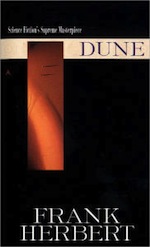 Frank Herbert’s beloved series is my favorite piece of science fiction. I whole-heartedly recommend the entire series, but will only mention the first novel here.
Frank Herbert’s beloved series is my favorite piece of science fiction. I whole-heartedly recommend the entire series, but will only mention the first novel here.
Dune immediately evokes the spice mélange. This consciousness-expanding drug falls squarely into the realm of pharmaco-psychonautics. In Dune the spice is but a catalyst, it provides the platform; the rest is up to the user. This launching point is square one for orders like the Bene Gesserit Sisterhood to train and hone their minds to extraordinary lengths. These women can assume control of a male mind, bypassing the logic centers to exert utter dominance with a word. They can render poison within their body harmless with a thought. They can even choose the sex of their offspring through willpower alone. The Bene Gesserit Sisters are the embodiment of what the psychonaut hopes to uncover—a conscious, working knowledge of the supremacy of the mind over the body.
But that’s not all! Enter the Mentats who have put their minds through such a rigorous regime of learning that they have become walking computers. Their thought processes are so sharpened and calculated that they actually say the words, “prime computation” before rendering an ultimate verdict on an issue. Through force of will and cerebral gymnastics, these mental giants re-shape and re-calibrate their brain. This speaks to the elasticity of human intellectual capability. Can we ever stop learning? The answer is, thankfully, “never.”
Dune is a masterpiece showcasing the power of human thought and will. This unfolds in a myriad of ways as imagined by the great genius Frank Herbert.
The Illuminatus! Trilogy by Robert Shea and Robert Anton Wilson
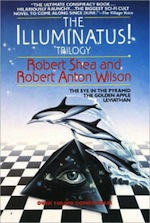 The Shea and Wilson cult masterpiece is something you’ll likely have to read more than once (or twice) over a period of years. If this were a multiple choice psychonautics quiz, The Illuminatus! Trilogy would be “all of the above.” Drugs, magic, meditation, and cerebral journeys fill the pages of this classic. The most succinct description I can render on this sprawling and tortuous text is that it is a type of detective story. A globe hopping, conspiracy-laden, mind expanding, magical, ritualistic, chaotic, hilarious, and intricate detective story. If you are an experienced and dedicated psychonaut you’ve likely read The Illuminatus! Trilogy four to five times already.
The Shea and Wilson cult masterpiece is something you’ll likely have to read more than once (or twice) over a period of years. If this were a multiple choice psychonautics quiz, The Illuminatus! Trilogy would be “all of the above.” Drugs, magic, meditation, and cerebral journeys fill the pages of this classic. The most succinct description I can render on this sprawling and tortuous text is that it is a type of detective story. A globe hopping, conspiracy-laden, mind expanding, magical, ritualistic, chaotic, hilarious, and intricate detective story. If you are an experienced and dedicated psychonaut you’ve likely read The Illuminatus! Trilogy four to five times already.
An interesting thing to note about this trilogy is that one of the protagonists is named Saul Goodman. Did Gilligan and Gould of Better Call Saul fame get that name from this work?
Oh, and I almost forgot, “fnord.”
The Manual of Detection by Jedediah Berry
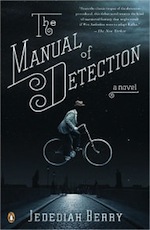 Oneironautics or the ability to travel within a dream on a conscious basis, sometimes referred to as lucid dreaming, seems to me to fall under the umbrella of psychonautics. Jedediah Berry’s very clever work explores this concept within a sinister setting.
Oneironautics or the ability to travel within a dream on a conscious basis, sometimes referred to as lucid dreaming, seems to me to fall under the umbrella of psychonautics. Jedediah Berry’s very clever work explores this concept within a sinister setting.
This magnificent novel is the best fictional representation I have seen on the subject of dreams. Without giving too much away … our protagonist, Unwin, must unravel a mystery that crosses into the ethereal world of dreams. Unwin is unprepared and inexperienced, he is the consummate neophyte who must survive the crucible of the mind.
Unwin is a clerk at a detective agency who is constantly studying case files. Naturally he accrues quite a bit of knowledge in the process. Suddenly he is promoted to the rank of detective. He must now put his knowledge to use or face the consequences of failure. He is the archetype for not only the psychonaut but any seeker of wisdom. There is a point when study yields diminishing returns and the seeker must engage in practical application. This is true for psychonautics, science, and just about everything worth learning.
The Manual of Detection is a one-two punch. It is a gripping tale that traverses beautifully into the realm of dreams. A realm considered to be the first step removed from the conscious mind in psychonautical exploration. Berry’s work also gives the psychonaut a relatable character in Unwin; truly we are all novices at one point.
Altered States by Paddy Chayefsky
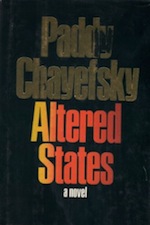 Paddy Chayefsky’s feelings on psychonautics were seemingly those of trepidation. Altered States asks not if we can unlock all of the brain’s abilities, but if we should. If we do unfurl all the mind’s complexities and return to the “source”, would that leave us as something other than human? Chayefsky asks this question in perhaps one of the only cautionary tales in this arena. If psychonautics had a safety manual this could be it.
Paddy Chayefsky’s feelings on psychonautics were seemingly those of trepidation. Altered States asks not if we can unlock all of the brain’s abilities, but if we should. If we do unfurl all the mind’s complexities and return to the “source”, would that leave us as something other than human? Chayefsky asks this question in perhaps one of the only cautionary tales in this arena. If psychonautics had a safety manual this could be it.
What I enjoy most about Altered States is that it merges science and mystic shamanism. The use of a lab and sensory deprivation tank is later coupled with shamanistic practices. When science and religion (or philosophy) come together, great and terrible things can happen.
Cloud Atlas by David Mitchell
 Cloud Atlas serves as means to whet the appetite for the psychonaut. David Mitchell’s ideas on reincarnation make for a great read, but they also open up an intriguing possibility for the psychonautically inclined. Consider that the mind does have multiple strata and these inhabit multiple planes of existence as the mystics claim. Now further contemplate that one or more of those strata dwell outside of space-time, a notion also posited by gurus. This suggests the possibility that a portion or strata of our minds exists in many different beings simultaneously, our past and future lives linked at a higher level of consciousness
Cloud Atlas serves as means to whet the appetite for the psychonaut. David Mitchell’s ideas on reincarnation make for a great read, but they also open up an intriguing possibility for the psychonautically inclined. Consider that the mind does have multiple strata and these inhabit multiple planes of existence as the mystics claim. Now further contemplate that one or more of those strata dwell outside of space-time, a notion also posited by gurus. This suggests the possibility that a portion or strata of our minds exists in many different beings simultaneously, our past and future lives linked at a higher level of consciousness
If reincarnation is real, the only thing separating our multiple incarnations is time. The big question here is whether our supposed extra-temporal mental stratum can be accessed with enough practice? Imagine being able to tap the wealth of knowledge of multiple lifetimes within one’s own psyche. This could well be the mother of all goals in psychonautics. Throw in the possibility of multiverses and you’ve got one heck of a spider web.
Top image from David Lynch’s Dune (1984)
 Patrick Hemstreet is a novelist, neuro-engineer, entrepreneur, patent-pending inventor, special warfare-trained Navy medic, standup comic, and actor. He lives in Houston, Texas with his wife and sons. The God Wave is his first novel.
Patrick Hemstreet is a novelist, neuro-engineer, entrepreneur, patent-pending inventor, special warfare-trained Navy medic, standup comic, and actor. He lives in Houston, Texas with his wife and sons. The God Wave is his first novel.










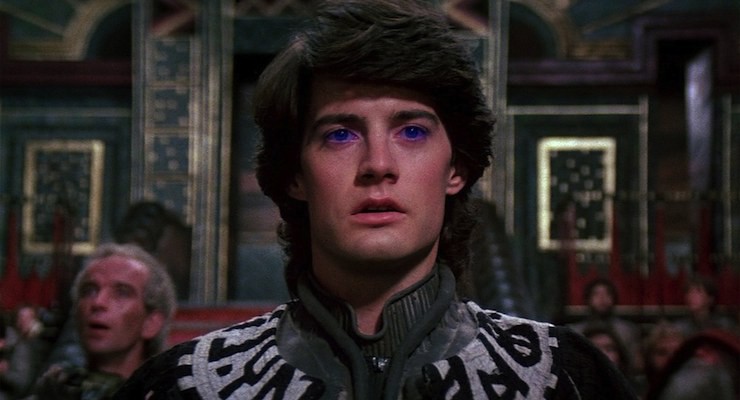
Thanks for the list of Psychonautic novels. It had never occurred to me that Oneironautics is part of Psychonautics. Another book that delves into the psyche of the dreaming mind is my debut novel, DreamWake. This explores dreams from the perspective of an experienced lucid dreamer and raises questions on whether Virtual Reality induced lucid dreams are really dreams at all. Some of my favorite Psychonautic novels include The Foundation Series by Isaac Asimov, and The Ender’s Game Quintet. Inevitably, psychonautics will collide with psychology in some very intriguing ways.
I think The Dream Master, the 1966 novel by Roger Zelazny (original novella “He Who Shapes”), would qualify. Neuroparticipant therapy is where the psychiatrist explores the patient’s mind, a dangerous thing if one isn’t careful.